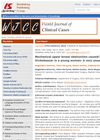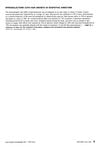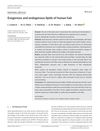 March 1997 in “Journal of Endocrinology/Journal of endocrinology”
March 1997 in “Journal of Endocrinology/Journal of endocrinology” Excessive hair growth in women can be treated with medications like spironolactone and finasteride, and male-pattern baldness in women can be improved with similar treatments.
[object Object]  169 citations,
August 2004 in “Baillière's best practice & research. Clinical obstetrics & gynaecology/Baillière's best practice and research in clinical obstetrics and gynaecology”
169 citations,
August 2004 in “Baillière's best practice & research. Clinical obstetrics & gynaecology/Baillière's best practice and research in clinical obstetrics and gynaecology” Lower doses of treatments for hirsutism and acne in PCOS are effective and cause fewer side effects.
 1265 citations,
October 2013 in “The Journal of Clinical Endocrinology and Metabolism”
1265 citations,
October 2013 in “The Journal of Clinical Endocrinology and Metabolism” The guideline suggests using specific criteria to diagnose PCOS, recommends various treatments for its symptoms, and advises screening for related health issues.
 52 citations,
June 1999 in “Endocrinology and Metabolism Clinics of North America”
52 citations,
June 1999 in “Endocrinology and Metabolism Clinics of North America” Antiandrogen treatments combined with oral contraceptives can help manage hair growth and hair loss in women with PCOS.
 42 citations,
January 2006 in “Obstetrical & Gynecological Survey”
42 citations,
January 2006 in “Obstetrical & Gynecological Survey” The document concludes that correct diagnosis and management of PCOS are important, and more research is needed on its risks and treatments.
 27 citations,
January 2013 in “Indian Journal of Dermatology, Venereology and Leprology”
27 citations,
January 2013 in “Indian Journal of Dermatology, Venereology and Leprology” PCOS is a complex disorder managed by treating symptoms and requires a team of specialists.
 23 citations,
January 2010 in “Journal of Medical Primatology”
23 citations,
January 2010 in “Journal of Medical Primatology” Hair loss in Rhesus macaques may be caused by a skin allergy-related condition.
 3 citations,
May 2016 in “Gynecological Endocrinology”
3 citations,
May 2016 in “Gynecological Endocrinology” Low-dose flutamide improved hirsutism and satisfaction in women but had common side effects, causing some to stop treatment.
 2 citations,
October 2008 in “The Journal for Nurse Practitioners”
2 citations,
October 2008 in “The Journal for Nurse Practitioners” The document concludes that managing PCOS requires a comprehensive approach, including lifestyle changes and medication, to improve symptoms and reduce health risks.
 1 citations,
January 2009 in “Elsevier eBooks”
1 citations,
January 2009 in “Elsevier eBooks” Combining proper shaving, topical treatments, and laser therapy effectively reduces Pseudofolliculitis Barbae.
 November 2023 in “Frontiers in pharmacology”
November 2023 in “Frontiers in pharmacology” Drug repositioning offers hope for new, affordable treatments for a genetic skin disorder called ARCI.
20 citations,
September 2015 in “Pediatric Annals” PCOS in teen girls should be managed with lifestyle changes and sometimes medication to improve symptoms and health.
 1 citations,
June 2021 in “Journal of gynecology and womens health”
1 citations,
June 2021 in “Journal of gynecology and womens health” The study found that PCOS affects about 6.5-6.8% of women in both urban and rural areas of Telangana, India, and highlighted the importance of lifestyle changes for management.
 54 citations,
January 2018 in “Scientific reports”
54 citations,
January 2018 in “Scientific reports” Human hair contains diverse proteins, including keratins and histones, which could help assess hair health and aging.
November 2021 in “SPAST Abstracts” The EFH-SLM cream is more effective and gentler for treating excessive hair growth in women.
 January 2020 in “Jornal Vascular Brasileiro”
January 2020 in “Jornal Vascular Brasileiro” Anticoagulant therapy may cause hair loss, especially in women, and stopping the medication can lead to hair regrowth.
 February 2024 in “World journal of clinical cases”
February 2024 in “World journal of clinical cases” A young woman had surgery to remove a large hairball that blocked her intestines and then got psychiatric help.
 23 citations,
October 2021 in “Cell Stem Cell”
23 citations,
October 2021 in “Cell Stem Cell” Hair thinning causes stem cell loss through a process involving Piezo1, calcium, and TNF-α.
 14 citations,
March 2010 in “Gynecological endocrinology”
14 citations,
March 2010 in “Gynecological endocrinology” New treatments for excessive hair growth in women include insulin modulators and enzyme inhibitors.

Hair follicle stem cells are crucial for touch sensation and proper nerve structure in mice.
16 citations,
September 1997 in “Oral surgery, oral medicine, oral pathology, oral radiology and endodontics” Hair loss from alopecia areata can rarely be caused by dental problems, and treating the dental issue may reverse the hair loss.
 November 1982 in “Inpharma”
November 1982 in “Inpharma” Spironolactone reduces hair growth in women with unexplained excessive hairiness.
 21 citations,
March 2017 in “Skin research and technology”
21 citations,
March 2017 in “Skin research and technology” Removing external lipids from hair reduces moisture and increases strength, while removing internal lipids decreases water permeability.
 76 citations,
January 2007 in “American Journal of Clinical Dermatology”
76 citations,
January 2007 in “American Journal of Clinical Dermatology” Women with PCOS often have skin problems like excessive hair, acne, hair loss, and dark patches, which can be treated with hormonal and non-hormonal therapies.
 6 citations,
July 2013 in “Acta Clinica Belgica”
6 citations,
July 2013 in “Acta Clinica Belgica” The document concludes that combination therapy is most effective for treating excessive hair growth in women with idiopathic hirsutism, and more research is needed to understand the condition.
[object Object]  140 citations,
August 2011 in “Biomaterials”
140 citations,
August 2011 in “Biomaterials” Keratose, derived from human hair, is a non-toxic biomaterial good for tissue regeneration and integrates well with body tissues.
 65 citations,
March 2018 in “Journal of Dermatological Science”
65 citations,
March 2018 in “Journal of Dermatological Science” Skin problems can be caused or worsened by physical forces and pressure on the skin.
 31 citations,
April 1999 in “Dermatologic Clinics”
31 citations,
April 1999 in “Dermatologic Clinics” Nd:YAG laser can reduce hair with multiple treatments, but permanent removal isn't guaranteed.
 11 citations,
February 2019 in “Frontiers in Physiology”
11 citations,
February 2019 in “Frontiers in Physiology” Hair properties are interconnected; a comprehensive, cross-disciplinary approach is essential for understanding hair behavior.
 3 citations,
January 2021 in “Wear”
3 citations,
January 2021 in “Wear” Hair's resistance to wear varies by ethnicity and treatment, with less wear indicating stronger hair.



























